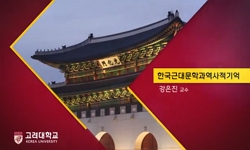This study examines the meanings of historical sense, focusing on features of the appropriation of history and nostalgia which are founded in Dictee by Hak Kyung Cha, the Korean-American Woman Writer. While nine chapters, associated wish nine muses, i...
http://chineseinput.net/에서 pinyin(병음)방식으로 중국어를 변환할 수 있습니다.
변환된 중국어를 복사하여 사용하시면 됩니다.
- 中文 을 입력하시려면 zhongwen을 입력하시고 space를누르시면됩니다.
- 北京 을 입력하시려면 beijing을 입력하시고 space를 누르시면 됩니다.

재미한인여성소설의 역사 전유와 노스탤지아 : 〈딕테〉를 중심으로 = The Appropriation Of History And Nostalgia In Korean-American Woman Writers’ Novels - Focusing on Dictee
한글로보기https://www.riss.kr/link?id=A82387168
- 저자
- 발행기관
- 학술지명
- 권호사항
-
발행연도
2010
-
작성언어
Korean
- 주제어
-
KDC
809
-
등재정보
KCI등재
-
자료형태
학술저널
-
수록면
57-79(23쪽)
- 제공처
- 소장기관
-
0
상세조회 -
0
다운로드
부가정보
다국어 초록 (Multilingual Abstract)
This study examines the meanings of historical sense, focusing on features of the appropriation of history and nostalgia which are founded in Dictee by Hak Kyung Cha, the Korean-American Woman Writer. While nine chapters, associated wish nine muses, in Dictee reveal different contents and different types of writings, they are combined by a common historic sense. This study consists of three findings. First, this Dictee tries to recollect the memories of heroins such as Yoo, Kwan Soon, Jeanne d’Arc and Saint Teresa and the residues of history such as martyrs, the oppressed and the others and mourn them. The diseuse in Dictee, a sort of diseuse de bon aventure, supervises ceremony of mourning by which the losses of the martyrs and the residues of history are realized. Second, it is indicated that the perception of dis-identity within home country and of identity as the other and diaspora let the diaspora refuse collective illusion regarding home country. Thus, nostalgia in the work moves toward eternal salvation, not toward illusion of home country. Third, Dictee is intended to deconstruct history of historicism, assuming historical progress, and to reconstruct history of discontinuous memories which contain perpetuity and moment at the same time. Therefore, Dictee represents de-historized history from the viewpoint of diaspora.
목차 (Table of Contents)
- 1. 서론
- 2. 상실된 것의 소환과 애도의 제의
- 3. 구원을 향한 노스탤지아
- 4. 반복과 영원성-역사와 탈역사
- 5. 결론
- 1. 서론
- 2. 상실된 것의 소환과 애도의 제의
- 3. 구원을 향한 노스탤지아
- 4. 반복과 영원성-역사와 탈역사
- 5. 결론
- 【참고문헌】
- 【Abstract】
동일학술지(권/호) 다른 논문
-
- 韓國批評文學會
- 백지은(Baek Ji-eun)
- 2010
- KCI등재
-
- 韓國批評文學會
- 장석원(Jang Seok-won)
- 2010
- KCI등재
-
- 韓國批評文學會
- 여태천(Yeo Tae-chon)
- 2010
- KCI등재
-
- 韓國批評文學會
- 정홍섭(Jung Hong-seop)
- 2010
- KCI등재




 ScienceON
ScienceON DBpia
DBpia





